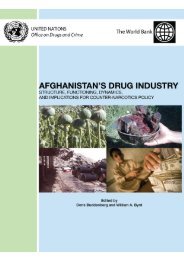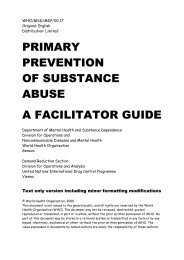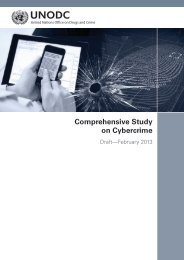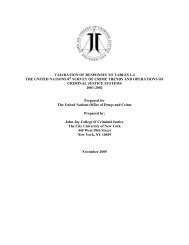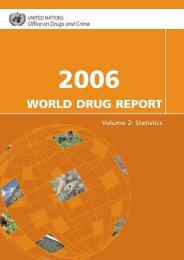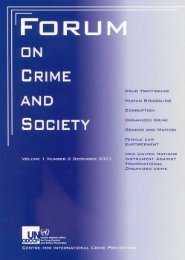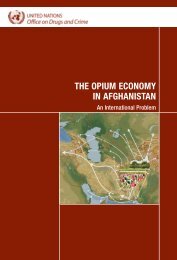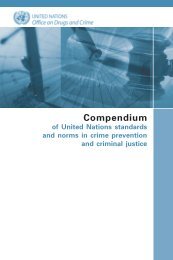Manual for Training Police on Anti Human Trafficking
Manual for Training Police on Anti Human Trafficking
Manual for Training Police on Anti Human Trafficking
Create successful ePaper yourself
Turn your PDF publications into a flip-book with our unique Google optimized e-Paper software.
Facilitating Skills<br />
This secti<strong>on</strong> is completely devoted to you, the trainer/facilitator. <str<strong>on</strong>g>Training</str<strong>on</strong>g> is all about enhancing<br />
per<str<strong>on</strong>g>for</str<strong>on</strong>g>mance by bringing about a change in the knowledge, attitudes and skills of the trainees. Module<br />
One and Two have covered the knowledge and awareness aspect while Module Three <strong>on</strong> facilitating<br />
change has dealt with attitude – those modules are <str<strong>on</strong>g>for</str<strong>on</strong>g> you to use with and <str<strong>on</strong>g>for</str<strong>on</strong>g> your participants. The<br />
last and remaining secti<strong>on</strong> is entirely and exclusively <str<strong>on</strong>g>for</str<strong>on</strong>g> you, the facilitator. Eventually, of course, the<br />
learning from this too will be passed <strong>on</strong> to your participants.<br />
1. TRAINING AND TRAINER/FACILITATOR AS AGENTS OF CHANGE<br />
<str<strong>on</strong>g>Training</str<strong>on</strong>g> is seen as a vehicle of change. The trainer/facilitator is the agent of change. Please see your<br />
training as a medium to bring about change especially in the c<strong>on</strong>text of AHT. Your interacti<strong>on</strong> with the<br />
participants should attempt not <strong>on</strong>ly to positively influence the particular individual who is being<br />
trained but this change should be c<strong>on</strong>tagious, or undergo a ‘ripple effect’. In other words attitudes of<br />
those who have underg<strong>on</strong>e training should undergo a change so that when they go back to the field,<br />
their behavior will have an impact <strong>on</strong> the behaviour of others. This training <strong>on</strong> AHT, will thus, act as a<br />
catalytic agent.<br />
Moreover because of the nature of the issue of human trafficking, you will have to be very clear as to<br />
what are your expectati<strong>on</strong>s of the participants when it comes to putting their learning into practice in<br />
the c<strong>on</strong>text of policing and AHT. Issues of building sensitivity will be accepted and grasped more easily<br />
if your participants can see them flowing from you. Howsoever clichéd it may sound, but practicing<br />
be<str<strong>on</strong>g>for</str<strong>on</strong>g>e preaching is tantamount to an effective facilitati<strong>on</strong> of change. ‘Preaching’ about gender sensitivity<br />
– encouraging participants to show respect and empathy towards the victims/survivors – such suggesti<strong>on</strong>s<br />
w<strong>on</strong>’t have nearly as fruitful outcomes unless you, the facilitator dem<strong>on</strong>strate them yourself. Thus, the<br />
following are some characteristics which you should manifest as a facilitator to ensure that your message<br />
gets carried through to your participants.<br />
Characteristics of a Trainer/Facilitator 45<br />
Empathy – Your understanding of the issue of trafficking must also be reflected through your interacti<strong>on</strong><br />
with the participants. Your sensitivity to the trafficking issue is most important in setting a precedent<br />
be<str<strong>on</strong>g>for</str<strong>on</strong>g>e you attempt to train other officers.<br />
H<strong>on</strong>esty – Projecting your quality as an h<strong>on</strong>est pers<strong>on</strong> is vital. Your ability to accept any mistakes in<br />
the discussi<strong>on</strong>s/training c<strong>on</strong>tent that may be pointed out by the participants is a positive thing.<br />
Patience – You must be patient with the trainees. Given the volatility of the issue and the fact that<br />
many participants have underg<strong>on</strong>e different levels/degrees of socializati<strong>on</strong> and might have resistance<br />
towards accepting new ideas, there may be situati<strong>on</strong>s where you may have to soothe tempers and<br />
appease all by firm yet polite interventi<strong>on</strong>s.<br />
Pace – It is essential that a c<strong>on</strong>sistent pace of the training sessi<strong>on</strong>s is maintained throughout. The<br />
participants must not lose interest nor must they be impatient to jump into the next sessi<strong>on</strong>.<br />
Democracy – While the set-up of the workshop is fairly well-planned and structured, the facilitator<br />
should welcome suggesti<strong>on</strong>s from the participants and discuss the same, subject to the level of its<br />
relevance. You must be seen as a democratic trainer/facilitator who is not going to <str<strong>on</strong>g>for</str<strong>on</strong>g>ce his/her<br />
understanding <strong>on</strong> the trainees/participants and willing to accept their views as well.<br />
Purpose – You must always clarify the purpose of incorporating any specific exercise/reading to the<br />
participants. The purpose of the training <strong>on</strong> AHT is to enable the participants to understand the issues<br />
and c<strong>on</strong>cepts related to trafficking and steps they ought to follow while interacting with the victim/<br />
survivor of trafficking.<br />
69




